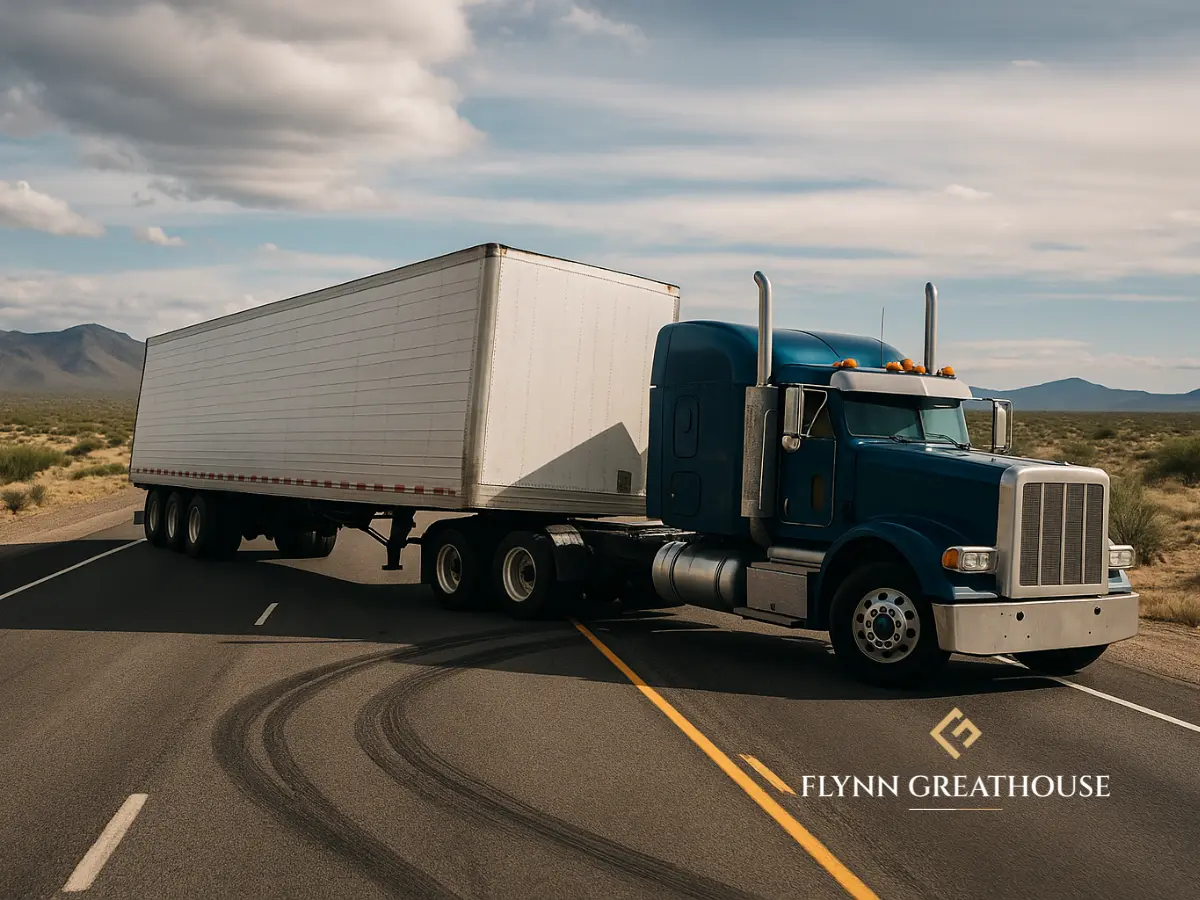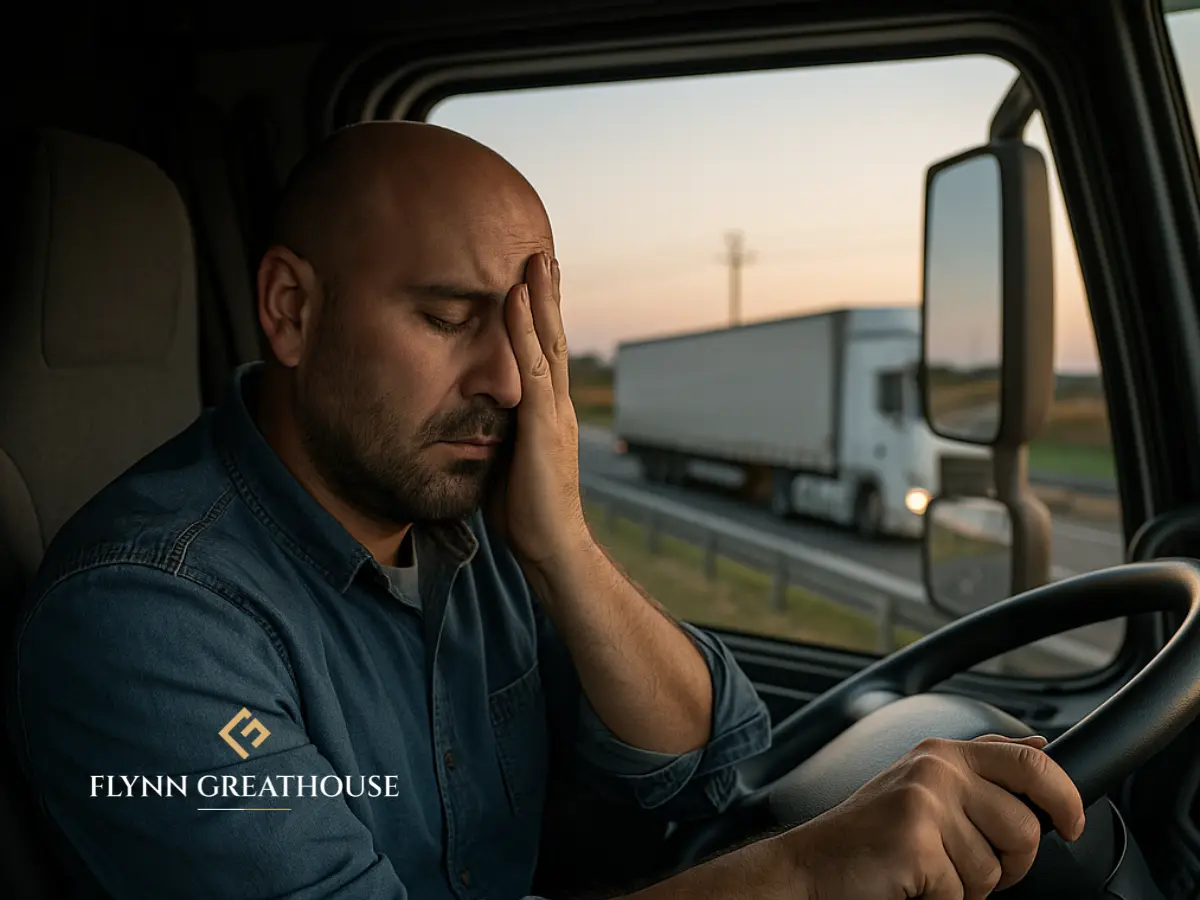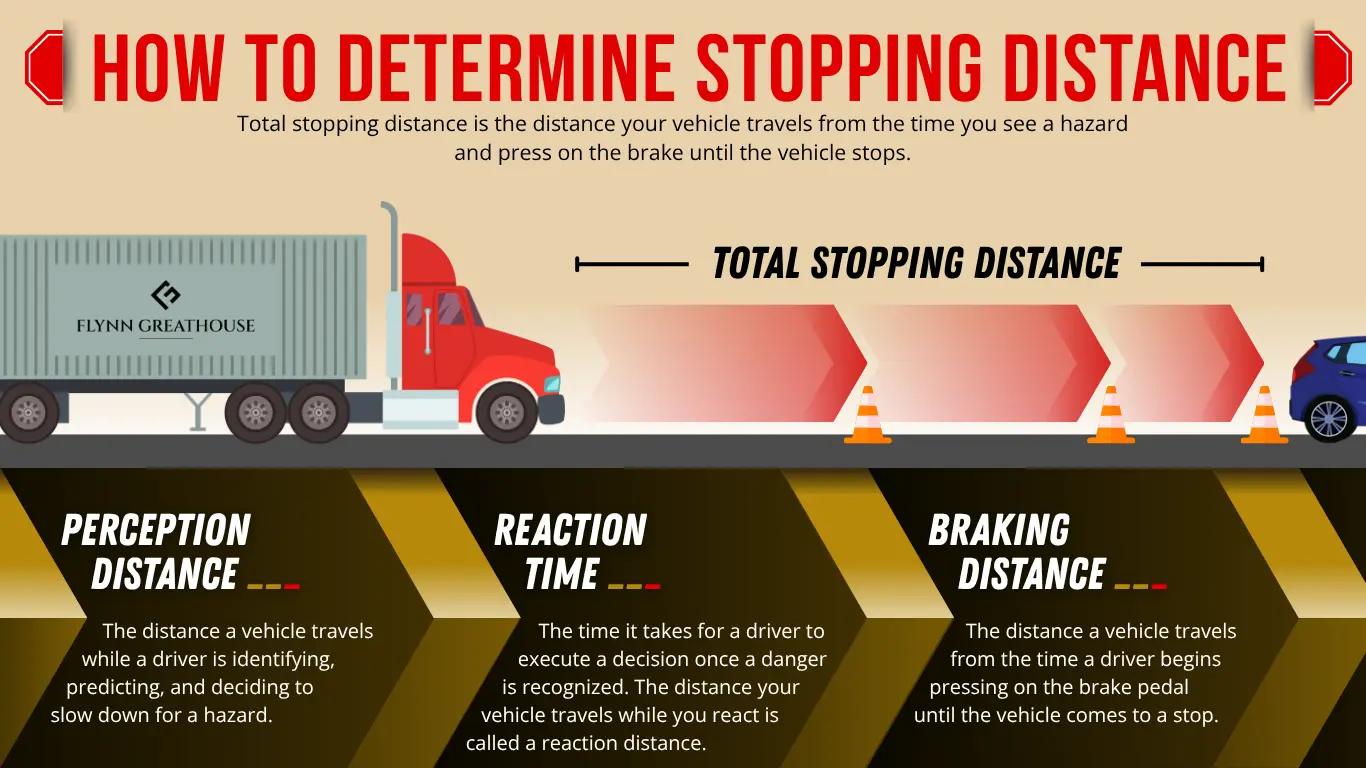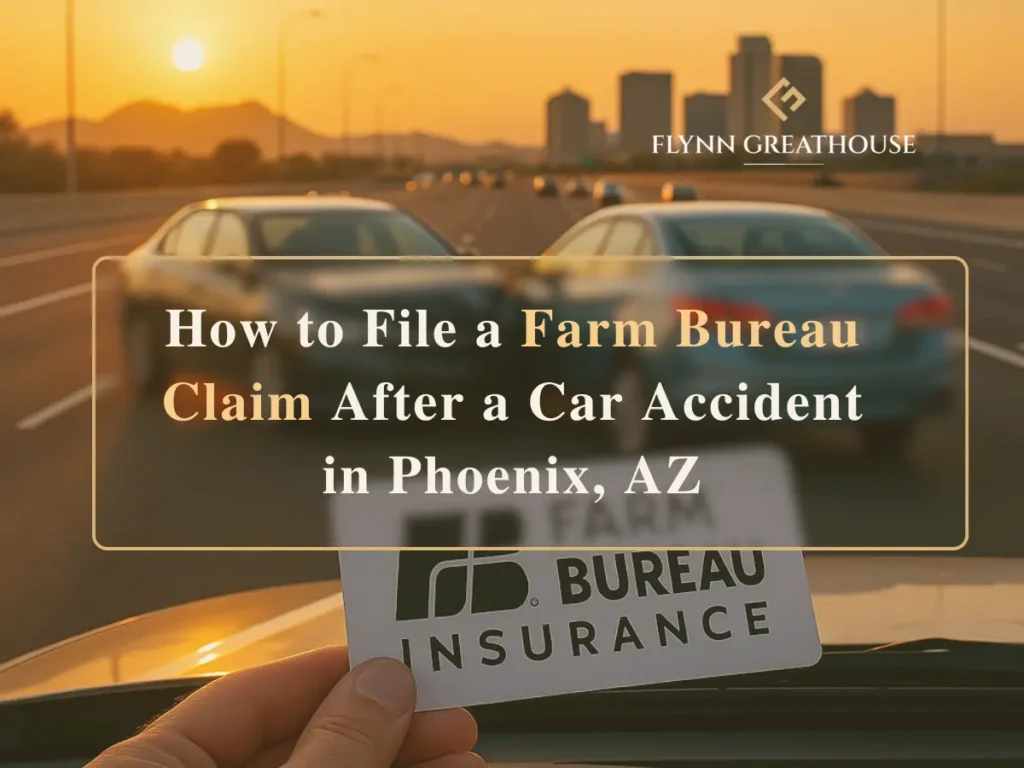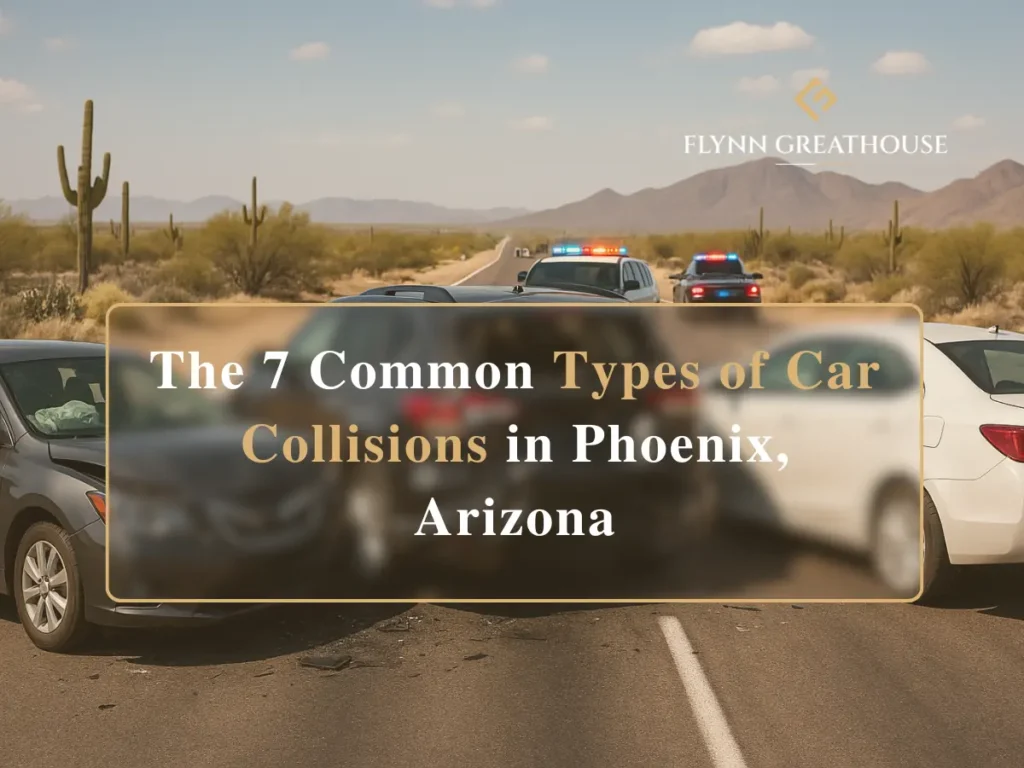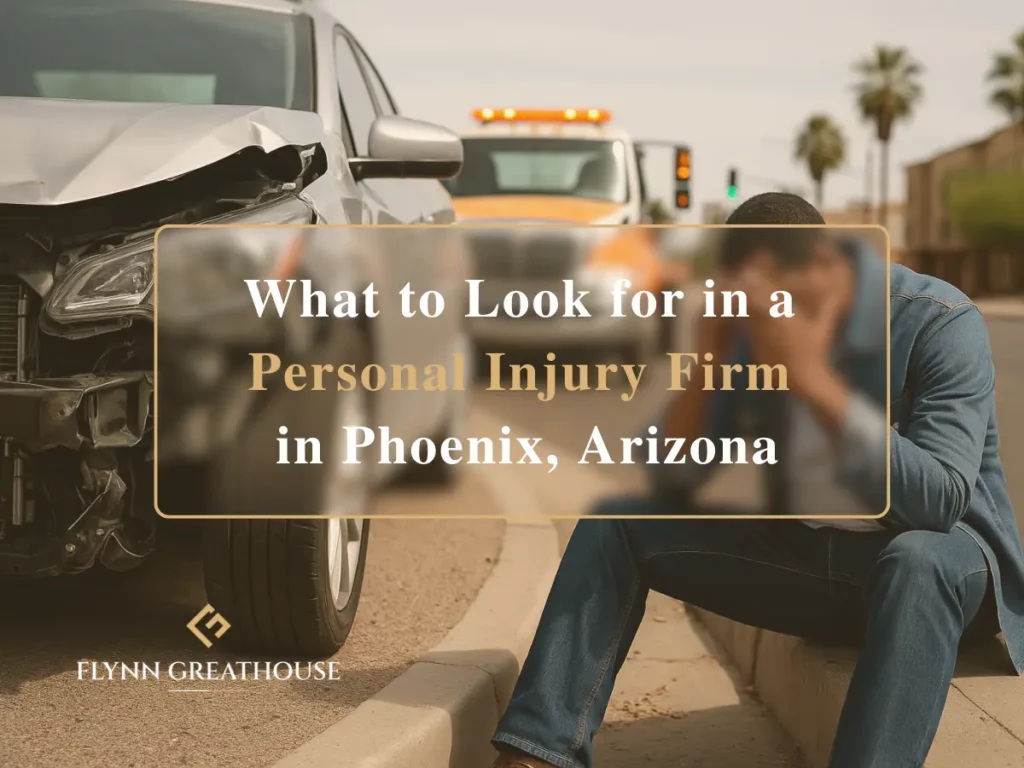What Causes Jackknife Tractor Trailer Accidents in Phoenix, Arizona?
August 15, 2025 – James Flynn, Esq and Riah Greathouse, Esq
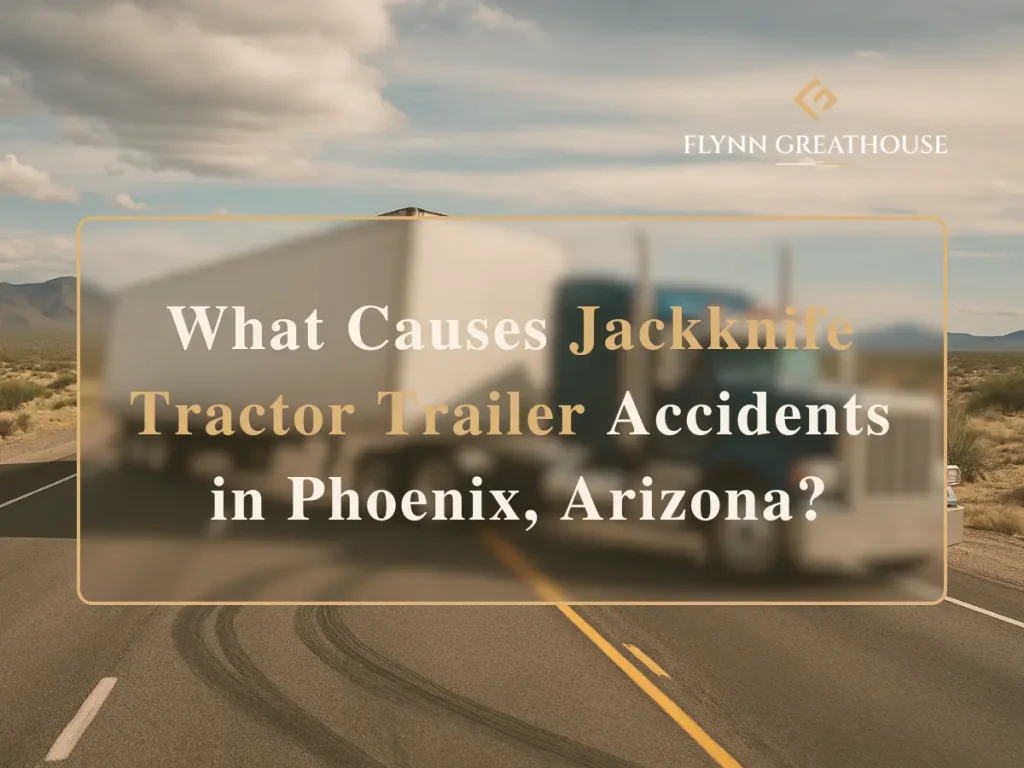
It only took a second. You were heading down I-10 when a tractor trailer in the next lane lost control. The trailer began to swing, folding in toward the cab like a pocketknife. Within moments, it blocked multiple lanes and crushed the car in front of you. What began as an ordinary drive turned into a nightmare.
Jackknife accidents involving semi trucks and other commercial trucks are among the most dangerous crashes on Arizona roads. These incidents often result in multi-vehicle pileups, severe injuries, and even fatalities, especially when they happen at highway speeds. If you or someone you love was injured in a jackknife tractor trailer accident in Phoenix, it’s important to understand what causes these crashes and what options may be available to you.
What Is a Jackknife Accident?
A jackknife accident happens when the trailer swings out at an angle toward the cab, creating a sideways skid that can block multiple lanes of traffic. This usually occurs when the trailer loses traction but the cab keeps moving forward, throwing the rig out of alignment.
Because of the vehicle’s size and momentum, the driver may lose control entirely. The trailer can sweep across adjacent lanes and crash into nearby vehicles, often triggering pileups and serious injuries.
While these crashes are often chaotic, many result from specific, preventable causes. Understanding what triggered the loss of control, whether it was speed, road conditions, improper loading, or mechanical failure is key to determining legal responsibility.
Common Causes of Jackknife Tractor Trailer Accidents
Several factors can lead to a jackknife crash in Phoenix. In many cases, more than one issue plays a role. Some of the most common causes include:
1. Sudden or Hard Braking
When a truck driver brakes too quickly, especially on a downhill grade or slick road, the trailer can continue moving forward while the cab slows down. This creates a pivot point where the trailer’s momentum overtakes the cab, forcing it to swing outward and potentially across other lanes.
Hard braking is often linked to:
- Following too closely
- Speeding in congested traffic
- Failing to anticipate traffic patterns
2. Speeding and Loss of Control
Speeding is one of the most common reasons commercial trucks lose control on Arizona highways. According to the Arizona Department of Transportation (ADOT), excessive speed plays a role in thousands of truck crashes each year.
When a fully loaded semi truck is traveling at 65 to 75 miles per hour, it can take the length of two football fields to come to a complete stop, even longer if the road is slick or downhill. That’s why speeding not only makes a jackknife more likely but also increases the damage once it happens.
3. Slippery or Uneven Road Conditions
Phoenix’s roadways may be dry most of the year, but monsoon season brings sudden downpours, flooding, and slick pavement. Even light rain can reduce traction and increase the risk of jackknifing if a truck driver is not operating cautiously.
Additional risk factors include:
- Oil slicks from other vehicles
- Sand and gravel on the road
- Uneven pavement or shoulder drop-offs
Jackknife crashes in Phoenix are more likely during monsoon season on stretches of highway like I-10, I-17, and Loop 202, where sudden storms, high-speed zones, and merging traffic can create dangerous conditions for large trucks.
4. Improper Cargo Loading
When cargo isn’t evenly distributed or securely fastened, the trailer’s center of gravity can shift during a turn or quick stop. That shift can cause the trailer to swing wide, throwing off the balance between the cab and trailer and triggering a jackknife.
Certain types of freight like logs, pipes, construction equipment, and unsecured pallets are more likely to cause balance issues. Federal cargo securement rules require specific tie-downs and weight distribution practices, and failing to follow them can lead to shared liability between the trucking company and the cargo loading team.
5. Inadequate Driver Training
Operating an 80,000-pound vehicle through busy highways and city traffic takes more than a commercial driver’s license. It requires skill, focus, and real-world training. Unfortunately, some trucking companies cut corners when demand is high or deadlines are tight.
Arizona law requires commercial drivers to meet strict licensing and training requirements, but that doesn’t stop every company from putting an unqualified driver behind the wheel. Mistakes like braking too late, overcorrecting in wet weather, or failing to respond to cargo shifting, can lead to a jackknife crash.
Some companies cut corners by:
- Hiring drivers without proper licensing
- Failing to provide training on jackknife prevention
- Ignoring safety violations to meet deadlines
6. Mechanical or Maintenance Failures
Tractor trailers are complex machines that require routine inspections and upkeep to stay road-safe. If a key system fails, whether it’s the brakes, steering, suspension, or tires, the driver may be unable to maintain control. That loss of control can cause the trailer to swing and jackknife across multiple lanes.
Brake failure is one of the most common mechanical issues linked to jackknife crashes. If the brakes are worn, unbalanced, or poorly adjusted, stopping the truck safely becomes nearly impossible, especially during sudden braking or downhill travel. Tire blowouts or steering malfunctions can also trigger jackknifing by throwing off the truck’s balance mid-maneuver.
In these cases, responsibility may fall on:
- The trucking company (for skipped or inadequate inspections)
- A third-party maintenance provider
- The manufacturer of a defective part
The Federal Motor Carrier Safety Administration (FMCSA) requires drivers to inspect their braking systems before every trip. If these inspections are skipped or done poorly, worn or uneven brakes can increase the risk of jackknifing, particularly during downhill travel or emergency stops.
7. Driver Fatigue
Truck drivers often work long hours under tight deadlines. Even with federal hours-of-service regulations, fatigue is still a major factor in commercial truck accidents. A drowsy driver may not react quickly enough to avoid a jackknife situation.
The FMCSA sets limits on how long truck drivers can operate without rest.
Common Injuries from Jackknife Truck Accidents
Jackknife accidents are rarely minor. These crashes often involve multiple vehicles and high speeds, which means victims are more likely to suffer serious or life-altering injuries.
Some of the most common injuries include:
- Traumatic brain injuries from direct impact or violent shaking
- Spinal cord injuries that can lead to paralysis or chronic pain
- Broken bones and internal organ damage caused by crushing or ejection
- Burn injuries from vehicle fires or fuel leaks
- Severe lacerations and disfigurement from shattered glass or twisted metal
Recovery from these types of injuries can take months or even years. Some victims face permanent mobility issues, require daily assistance, or must leave the workforce entirely. In the most tragic cases, families may have grounds for a wrongful death claim under Arizona law.
Who Is Liable in a Jackknife Accident?
Liability in a jackknife accident often depends on what caused the crash. In many cases, more than one party may be responsible. Possible defendants in a truck accident lawsuit may include:
- The truck driver (for speeding, fatigue, or distraction)
- The trucking company (for unsafe policies or poor training)
- A cargo loading company
- A maintenance provider
- The manufacturer of a defective truck part
- Another driver who triggered the event
Determining liability usually requires a detailed investigation. Phoenix truck accident attorneys may request the truck’s black box data, driver logs, maintenance records, and cargo reports to build a case. If you were injured in a commercial vehicle accident, this evidence can be vital to your personal injury claim.
What Damages Can You Recover?
If you were hurt in a truck accident in Phoenix, you may be able to file a personal injury lawsuit to recover damages for:
- Current and future medical expenses
- Lost wages and reduced earning capacity
- Pain and suffering
- Property damage
- Emotional distress
- Loss of enjoyment of life
If your injuries are permanent or disabling, the claim may also include future medical expenses such as physical therapy, mobility devices, or in-home care. In some cases, the court may also award punitive damages if the trucking company or driver acted recklessly.
What If the Insurance Company Denies Your Truck Accident Claim?
It’s not unusual for insurance companies to deny claims or offer far less than your case is worth. They may argue that:
- You were partially at fault
- Your injuries weren’t caused by the crash
- The trucking company isn’t liable
- You missed a filing deadline
Arizona follows a pure comparative fault rule, which means your compensation can be reduced if you were partly at fault, but you can still recover damages.
Working with a Phoenix personal injury lawyer who understands commercial trucking industry practices and local court procedures can make a major difference in how your truck accident case is resolved.
How Long Do You Have to File a Truck Accident Lawsuit in Arizona?
Arizona’s statute of limitations for most personal injury claims is two years from the date of the accident. That includes claims related to commercial truck accidents, jackknife crashes, and wrongful death cases.
If the accident involved a government vehicle or road maintenance issue, shorter deadlines may apply.
Talk to a Phoenix Injury Attorney Who Takes on the Tough Cases
A jackknife crash can leave you dealing with more than just physical pain. You may be buried in medical bills, unable to work, and unsure how to get a fair outcome. That’s where we come in.
At Flynn Greathouse, we focus exclusively on motor vehicle accidents in Arizona, including serious truck accident claims involving commercial trucks, truck drivers, and trucking companies that cut corners. Our legal team investigates what happened, pursues full and fair compensation for your injuries, and manages every part of the legal process, so you don’t have to.
Other Phoenix truck accident attorneys may take a general approach. We don’t. Our truck accident lawyers are prepared to challenge even the largest insurance providers when they refuse to take responsibility.
If you were injured in a jackknife tractor trailer accident, Flynn Greathouse can evaluate your Phoenix truck accident claim and take legal action on your behalf. Call (888) 823-4529(888) 823-4529 or contact us online to schedule your free consultation.
We’ll handle the legal side while you focus on moving forward.
Copyright © 2025. Flynn Greathouse. All rights reserved.
The information in this blog post (“post”) is provided for general informational purposes only and may not reflect the current law in your jurisdiction. No information in this post should be construed as legal advice from the individual author or the law firm, nor is it intended to be a substitute for legal counsel on any subject matter. No reader of this post should act or refrain from acting based on any information included in or accessible through this post without seeking the appropriate legal or other professional advice on the particular facts and circumstances at issue from a lawyer licensed in the recipient’s state, country, or other appropriate licensing jurisdiction.
Flynn Greathouse
2 N Central Ave, Suite 1844
Phoenix, AZ 85004
(888) 823-4529(888) 823-4529
(888) 823-4249
http://mycaraccidentattorneys.com/


